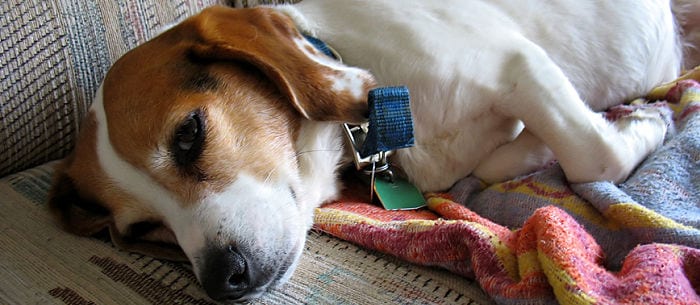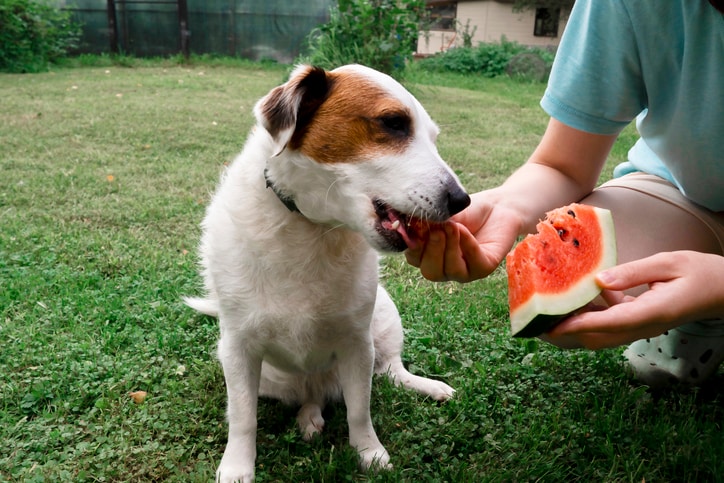Most people experience the uncomfortable issue of constipation at some point. Dog constipation is no different for your pet.
You probably know what constipation in humans is. In dogs, it is the same thing. Dr. Brian Voynick, owner and director of the American Animal Hospital in Randolph, New Jersey, defines constipation as difficult or infrequent bowel movements that produce hard stools. The longer stool sits in the colon, the more water is absorbed. The stool then becomes difficult to pass, and your dog gets pretty uncomfortable.
“If you notice your dog hasn’t had a bowel movement in the last day or two, or is straining to have one and nothing is coming out, see a vet ASAP to determine the cause,” says Voynick. He adds that constipation may be mistaken for a urinary tract infection. Straining to urinate affects the posture in the same way. Either way, it’s time to call the vet.
Dr. Voynick shares the 6 most common reasons for dog constipation:
- Poor Nutrition
Make sure your dog gets some fiber, not just meat and bones. Switching to canned foods or adding canned pumpkin to meals helps.
- Lack of Exercise
Walk that dog! A sedentary lifestyle can upset the bowels. As with many health issues, a brisk walk can alleviate the problem. Bring a ball to the park to really get your dog moving.
- Excessive Self-Grooming
Just like hair can clog the shower drain, fur that ends up in your dog’s intestinal tract causes major blockage. Take some time to brush your pet’s fur or schedule a trip to the groomer.
- Medication
Is your dog on medication? Some medicines, including antihistamines and narcotic pain relievers, list constipation as a side effect. Ask your veterinarian if changing prescriptions is appropriate.
- Severe Arthritis
Older dogs, like older people, are prone to constipation. Consult with your vet about the different nutritional and medical needs of older pooches versus puppies.
- Dehydration
Not getting enough water causes stool to dry and harden. Make sure your dog has a constant supply of fresh, clean water.
Dr. Voynick points out what parents already know — dogs tend to hang out by the high chair. Children sometimes feed pets things dogs shouldn’t have or toss them bones, which can aggravate the bowels. “If the dog is being fed food that has less plant material and too much meat, his diet may become very unbalanced. If children give chocolate or make chocolate accessible, this can affect constipation, and may be fatal … never feed chocolate to dogs!”
Keep a close eye on what is at the dog’s eye level, recommends Dr. Christina Lorenson, a veterinarian at the Wickford Veterinary Clinic in North Kingston, Rhode Island. “Foreign objects such as small toys and Easter grass should be kept away,” she says. Also make sure your dog cannot get hold of any stray socks or ribbons.
If you notice your dog keeps trying to defecate and seems to, in general, lack energy — two common side effects of dog constipation — it’s time to call the vet. Treatment depends on the cause, so the vet’s input is crucial. If your vet determines the constipation isn’t medically serious, you can give the dog a stool softener.
Dr. Voynick recommends laxatives such as Metamucil, Lactulose, aloe vera juice (check with your vet as this is controversial), olive oil or mineral oil. An enema offers immediate relief, but also poses serious risks if not done professionally.
You can’t avoid the awkward conversation. If your dog suffers from constipation, the caregivers and walkers need to know. Dr. Lorenson recommends telling the dog walkers about any medical conditions a dog has (including constipation), medications and warning signs. “If a dog sitter notices abnormal stool (either hard or soft) or straining during the walk, he should let the owner know,” she says. You also need to let your dog walker know what your dog should and should not eat.
Dr. Voynick adds, “Owners should inform caregivers verbally and in writing, so they have easy access to information. Provide the vet’s number and emergency numbers.” He recommends giving caregivers ample supply of your dog’s medication and have them observe that the dog actually takes it. They should also take note of the dog’s bowel movements so they can report changes.
For more on dog health, read 12 Toxic Plants for Dogs. If it’s your feline you’re worried about, check out these 6 Remedies for Cat Constipation!
Laura Richards is a Boston-based freelance writer and the mother of four boys including a set of identical twins. She is also mom to three rescue pets: Scarlett, a 7-year-old Beagle, and Edith and Ollie, 15-year-old identical twin cats. She has written for numerous parenting publications and is the president of On Point Communications.
* This article is for general informational purposes only. It is not intended nor implied to be providing medical advice and is not a substitute for such advice. The reader should always consult a health care provider concerning any medical condition or treatment plan. Neither Care.com nor the author assumes any responsibility or liability with respect to use of any information contained herein.


